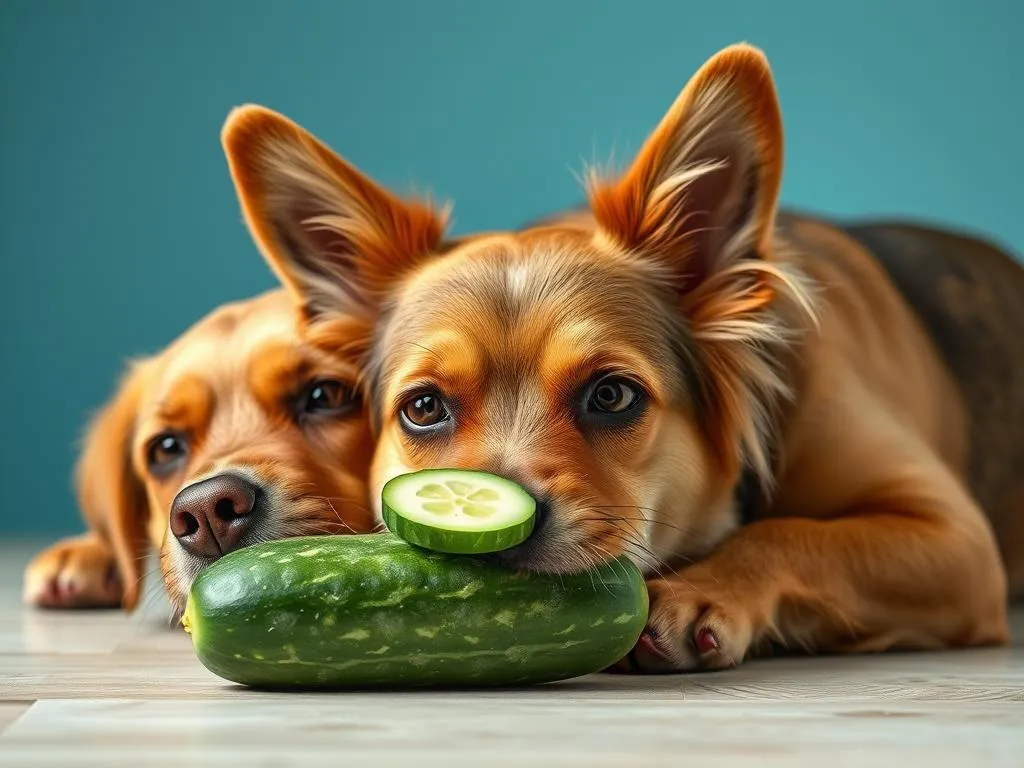
Introduction
Overview of Dog Nutrition
Understanding dog nutrition is crucial for your furry friend’s health and well-being. A balanced diet is the foundation of a happy, energetic, and healthy dog. Just like humans, dogs require a variety of nutrients to thrive. However, there are many misconceptions about what constitutes a healthy diet for dogs, leading to potential health issues.
Focus on Vegetables in Dog Diet
Incorporating vegetables into your dog’s diet can offer numerous benefits. Vegetables are rich in vitamins, minerals, and fiber, which can aid in digestion and contribute to overall health. Today, we will focus on cucumbers as a dog-friendly snack that can enhance your pup’s diet.
Section 1: Nutritional Needs of Dogs
Essential Nutrients for Dogs
Every dog’s diet should include essential nutrients:
- Proteins: Vital for growth, maintenance, and repair of tissues.
- Fats: Provide energy and support cell function.
- Carbohydrates: Serve as an energy source and aid in digestive health.
- Vitamins: Essential for various bodily functions.
- Minerals: Important for bone health, nerve function, and muscle contraction.
Role of Fruits and Vegetables
In addition to the above nutrients, fruits and vegetables play a significant role in your dog’s diet. They offer:
- Fiber: Supports digestive health and prevents constipation.
- Vitamins and Antioxidants: Help boost the immune system and fight against free radicals.
Common Dog Dietary Issues
Many dogs face dietary challenges such as obesity, allergies, and digestive problems. Understanding these issues can help you make informed decisions about your dog’s diet.
Section 2: Overview of Cucumbers
Nutritional Profile of Cucumbers
Cucumbers are a fantastic addition to your dog’s diet. They are low in calories, making them an excellent snack for dogs prone to weight gain. Their high water content (about 95%) can help keep your dog hydrated, especially during hot weather. Cucumbers also contain:
- Vitamins: A, C, and K.
- Minerals: Potassium, magnesium, and manganese.
Health Benefits of Cucumbers for Dogs
Cucumbers provide several health benefits for dogs, including:
- Hydration and Weight Management: Their high water content helps keep dogs hydrated without adding many calories.
- Cooling Effect: Perfect for hot days or after exercise, cucumbers can help cool your dog down.
- Dental Health Benefits: Chewing on cucumbers can help reduce plaque and promote dental health.
Section 3: Can Dogs Eat Cucumbers?
Safety of Cucumbers in Dog Diet
Yes, dogs can safely eat cucumbers! However, there are a few considerations to keep in mind:
- Potential Risks: Always be aware of your dog’s individual reactions to new foods.
- Serving Sizes: Small dogs should be given smaller pieces, while larger dogs can handle larger chunks.
How to Prepare Cucumbers for Dogs
Proper preparation of cucumbers is essential:
- Washing: Always wash cucumbers thoroughly to remove any pesticides or dirt.
- Cutting Techniques: Cut cucumbers into small, manageable pieces to prevent choking.
- Serving Suggestions: Serve cucumbers raw for the best texture and taste. Avoid pickled cucumbers, as they often contain salt and other additives that are not safe for dogs.
Section 4: Potential Risks and Considerations
Allergic Reactions
While cucumbers are generally safe, some dogs may have allergies. Signs of cucumber allergies in dogs can include:
- Vomiting
- Diarrhea
- Itching or skin irritations
If your dog shows any of these symptoms after eating cucumbers, discontinue feeding them and consult your veterinarian.
Digestive Issues
Dogs with sensitive stomachs may experience digestive issues when introduced to new foods. Monitor your dog for any signs of distress after consuming cucumbers.
Choking Hazard
Cucumbers can pose a choking hazard if not prepared correctly. Ensure that you cut the cucumber into small, bite-sized pieces appropriate for your dog’s size.
Section 5: How to Incorporate Cucumbers into Your Dog’s Diet
Creative Ways to Serve Cucumbers
There are many fun and creative ways to incorporate cucumbers into your dog’s diet:
- As a Treat: Serve fresh cucumber slices as a crunchy treat.
- Meal Topper: Add small pieces of cucumber on top of your dog’s regular food for added texture and nutrition.
- Frozen Treats: Freeze cucumber slices for a refreshing snack on hot days.
Combining with Other Dog-Friendly Foods
Pair cucumbers with other dog-safe foods for a nutritious boost. Some great combinations include:
- Cucumbers and Chicken: Mix chopped cucumbers with cooked chicken for a delicious meal.
- Cucumbers and Carrots: Pair with carrots for added crunch and nutrition.
Section 6: Other Healthy Vegetables for Dogs
List of Dog-Safe Vegetables
In addition to cucumbers, many other vegetables are safe and healthy for dogs. Some of these include:
- Carrots: Great for dental health and low in calories.
- Green Beans: High in fiber and low in calories.
- Sweet Potatoes: Packed with vitamins and fiber.
Comparative Benefits
Each of these vegetables has unique nutritional benefits. For instance, carrots are high in beta-carotene, while sweet potatoes provide a rich source of fiber and vitamins. Including a variety of vegetables can help ensure your dog receives a balanced diet.
Section 7: Conclusion
Summary of Key Points
In summary, can dogs eat cucumbers? Yes, cucumbers are a nutritious, low-calorie snack that can provide hydration and various health benefits for dogs. They can be a valuable addition to your dog’s diet when prepared properly.
Final Thoughts on Dog Nutrition
A varied diet is essential for your dog’s overall health. While cucumbers are a great option, it’s important to consult with your veterinarian before making any significant changes to your dog’s diet to ensure it meets their specific nutritional needs.
Section 8: FAQs
Common Questions About Dogs and Cucumbers
-
Can puppies eat cucumbers?
Yes, puppies can eat cucumbers in moderation. However, consult your veterinarian for specific guidance based on their age and dietary needs. -
Can dogs eat pickles?
It’s best to avoid pickles as they often contain high levels of salt and spices that may not be safe for dogs. -
How often can I give my dog cucumbers?
Cucumbers can be offered as an occasional treat. Monitor your dog’s response and adjust accordingly.
Section 9: References
Citations for Studies and Articles
Relevant studies on dog nutrition and the benefits of vegetables can provide further insights into this topic. Additionally, various reputable books and websites are available for pet owners interested in learning more about dog care and nutrition.









